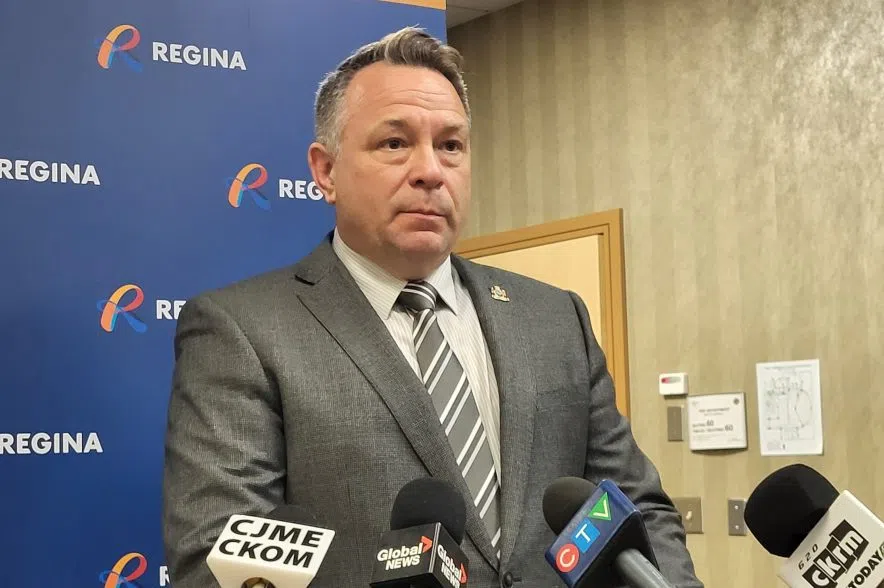Regina City Council has voted against reconsidering the decision to fluoridate its water supply starting in 2026.
On Friday, council heard from numerous delegates on the hot-button issue during a special council meeting.
Councillors Clark Bezo (Ward 10), Shobna Radons (Ward 7) and Dan Rashovich (Ward 1) voted in favour of the reconsideration while councillors Jason Mancinelli (Ward 9), David Froh (Ward 3), George Tsiklis (Ward 2), Mark Burton (Ward 4), Sarah Turnbull (Ward 5), Victoria Flores (Ward 6) and Mayor Chad Bachynski voted against it.
Ward 8 Coun. Shanon Zachidniak was absent.
Councillor Bezo motioned for the meeting, expressing concern about potential negative neurological health effects of fluoride – particularly for children.
“I have to say that (I’m) disappointed in the vote,” Bezo said after the meeting.
“I have to respect the fellow councilors’ decisions based upon the evidence and the subject matter expert that was given. It’s still a contentious issue within Regina, we haven’t had fluoride since 1905 and we’ve had a lot of different plebiscites in the past, so I’m not sure what’s going to go from here.”
Council first decided to approve the use of fluoride in 2021. During Friday’s meeting Coun. Froh said council should defer to those with relevant expertise on the matter.
“What we’re doing here today, debating science at City Hall is absolute lunacy. This motion and what we’re doing contributes to overall erosion of trust in our public institutions,” Froh said.
“If I were to spend thousands of hours required to be a chemist or a doctor, I would be one. I enjoy playing basketball, but playing senior men’s basketball makes me no more fit to play in the NBA. Does googling fluoride make me a chemist? There’s simply such thing as expertise. We have it in this country, we have it in this province.”
Read more:
- Mental health overarching theme in Sask. child advocate’s 2024 report
- ‘Sleepless nights’: Glen Elm trailer park residents expecting services to be shut off
The motion Bezo drafted cited concerns about fluoride potentially lowering the IQ scores of children, drawing from studies from JAMA Pediatrics, Slate, and the National Toxicology Report.
He motioned to postpone fluoridating the water supply until “there is conclusive evidence there are no significant neurotoxic effects or other bodily harms” associated with its use failed.

Ward 10 Coun. Clark Bezo said he was disappointed in the decision but respected the decision of his fellow councillors. (Daniel Reech/980 CJME)
Dr. Susan Petryk, a Regina pediatrician, said dental health is a vital component of general health and that community water fluoride reduces cavities by 25 per cent across all ages.
“This means fewer fillings, fewer extractions, fewer root canals and fewer emergency visits — especially for the families who can least afford them,” she said.
Petryk also pushed back against the claim that fluoride negatively impacts the IQ at the recommended dosage of 0.7 milligrams per litre.
“In medicine, nothing is 100 per cent. We have the balance of benefits and drawbacks,” she said.
“I talk about this every day when I am giving counselling for medication. There are side effects to any medication you can take … I think the balance of benefit far outweighs any drawbacks.”
Petryk said community water fluoride would benefit children, elderly and vulnerable populations.
Most of the delegates, however, spoke out against fluoridated water.
Dave McDonald said he supported the reconsideration as a matter of the right for individuals to choose and also out of concern for the potential environmental impacts fluoride could bring.
“Currently, people who want to make use of fluoride products have the option to do so, such as in toothpaste, mouthwash, gels and foams,” McDonald said.
“If fluoride is put in the drinking water, people won’t have a choice not to consume it other than installing expensive water treatment systems such as reverse osmosis systems.”
McDonald said reverse osmosis systems could increase overall water use in the city.
Scott Carson voiced his opposition to having fluoride in the water. He said as a medical issue, it shouldn’t come down to a referendum or public opinion.
“The fact that you have so many competing studies should give you pause right there,” Carson said.
“If there is this much doubt — 0.7 per cent doubt — it’s too much.”
Radons criticized the 2021 decision for not doing their due diligence and consulting with taxpayers.
“There was enough people that reached out from the community that have said they do not consent to fluoride in their water. They do not want fluoride in their water. We have dismissed them — not (only) once four years ago, but now once again,” Radons said.
“I think that this is an important factor, and we need to have that done. And I feel like I’m not disputing science, that’s not what I’m saying here. What I’m disputing is the process in how we got to this day today.”
Council heard from numerous delegates from outside Regina, including from Dr. James A. Dickinson of the Canadian Fluoridation Society and the University of Calgary.
Dickinson called into question some of the studies cited by Bezo, Rashovich and some of the presenting delegates.
“You’d have to drink swimming pools of water to reach toxic levels of fluoride,” he said.
Dickinson also challenged the idea that fluoride affects cognitive development.
“It’s not enough to say that fluoride might cause a reduction in intelligence. It might cause people to grow a third eye, but it doesn’t,” Dickinson joked.
“The motion asserts that emerging scientific evidence provides potential negative impacts of fluoride, but there are proven negative impacts of not (having) fluoridation. The strongest evidence comes from modern studies in Sweden, New Zealand, Australia — none of them found any effect of fluoridation on intelligence. The motion before you repeatedly cites the same invalid material dished up in different ways. A small group of people twist selected samples to show what they want to find.”
Dickinson said not fluoridating community water condemns many people to dental decay and lifelong high dental costs.
Regina has held four referendums between 1954 and 1985 — all of which resulted in the majority of residents opposing fluoride.
According to a recent survey by Saskatoon-based Spadina Strategies, 52 per cent of 458 people polled in Regina support adding fluoride to city water.
During the debate of the main motion, an official with the Saskatchewan Health Authority called the addition of fluoride to water systems “one of the most significant public health interventions this past century,” he said.
“It has led to a notable decrease to decay rates. It’s practical, it’s cost-effective, it’s equitable. It addresses dental issues that can affect quality of life.”
The official also insisted fluoride was safe and not linked to any neuro-developmental issues, especially at the optimum level of 0.7 ml/l.
Read more:











